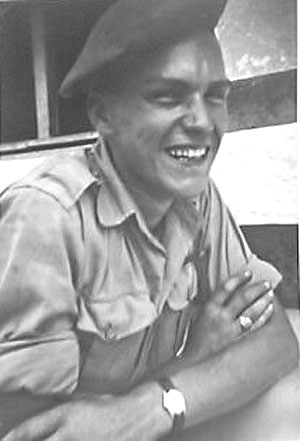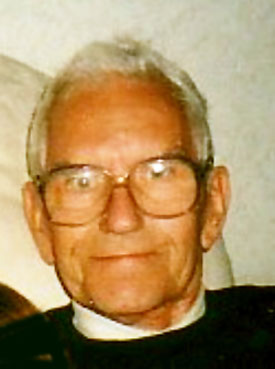Name: Leonard Dennis Moss
Rank: Private
Unit: 11th Parachute Battalion
Regiment: 4th Parachute Brigade
 I was born on September 11, 1924 and grew up in the East End of London. I left school at 14 to become a cabinet
maker's apprentice, but on my 18th birthday I was drafted into the army as an infantryman.
After passing through my basic training I joined the Parachute Brigade because they earned
an extra two schillings a week danger money. In September 1944, as a member of the 11th
Parachute Batallion, 4th Parachute Brigade, I was allocated to take part in the second day
of Operation Market Garden. I recall we had endured 16 false alarms and stand downs until
finally being given the go-ahead.
I was born on September 11, 1924 and grew up in the East End of London. I left school at 14 to become a cabinet
maker's apprentice, but on my 18th birthday I was drafted into the army as an infantryman.
After passing through my basic training I joined the Parachute Brigade because they earned
an extra two schillings a week danger money. In September 1944, as a member of the 11th
Parachute Batallion, 4th Parachute Brigade, I was allocated to take part in the second day
of Operation Market Garden. I recall we had endured 16 false alarms and stand downs until
finally being given the go-ahead.
So I flew in on the second day of Operation Garden, to be dropped on Ginkel Heath some six miles outside of Arnhem. This was further away than we would have liked. I had just turned 20 years old a week earlier. Flying in to the drop zone in a Dakota C47 we could hear the flak exploding all around us. We were taking extremely heavy fire from German gun emplacements around the drop zone. I was number two in the drop stick and was a PIAT man (Portable Infantry Anti Tank, the British equivalent of the Bazooka). I carried the PIAT, had a pneumatic trolley to transport it when on the ground and a huge kit bag strapped to my leg with three PIAT Bombs. My number two was Pvt. Bill Kent who carried all the other PIAT bombs. We were a team and very close friends.
Through the small rectangular glass windows behind me in the C47, ominous grey and black puffs of smoke could be seen. This was German Anti-Aircraft fire from 88mm guns on the ground. At the rear of the plane by the door, stood a tall American Dispatcher, chewing gum and leaning casually on the frame like he'd seen it all before. First in line and ready to go out of the door was Lt. Alan Vickers. A loud burst of flak shook the whole airframe. An explosion occurred close by and spent shrapnel scrapes along the C-47's metallic fuselage prompting a few nervous glances from the less experienced Paratroopers. This was not what we had to expected to encounter. Another Anti-Aircraft round exploded below the C-47. Several small pieces of shrapnel rip exploded through the fuselage floor and disappeared out the roof. Daylight was clearly visible through the holes. The Dispatcher checked his watch once more, hooked his safety line to the airframe and shouted. We stood and attached our parachute static lines to a rod that ran the length of the C-47's fuselage roof.
Each man checked the line of the man in front and they sound off down the line... By the door was my large metal trolley used for hauling the P.I.A.T pack. The Dispatcher started to check it over prior to deployment. More Anti-Aircraft air burst shells exploded close by in quick succession rattling the whole airframe. This time small arms fire from Germans on the ground ripped through the fuselage. The C47 engines feathered back enabling the C47 to lose altitude. We were going to jump at just 500 feet. A red light above the door by the Dispatcher's head came on. Everyone looked at the un-lit green bulb beside it expectantly. There was another explosion close by outside. Things were getting rocky. The Dispatcher hurled open the door in readiness and air rushed in. The sound of exploding Anti-Aircraft fire suddenly got much louder. Explosions and puffs of black smoke rose from the ground telling us that this is a very hot zone. The ground was just five hundred feet below, looking like a patchwork quilt of fields. It was pitted with shell holes and British gliders from the previous day's drop. There were other aircraft around too, mainly C-47's hauling gliders. Hundreds of them. Shedding their load. The sky was awash with men and parachutes.
A large WACO Glider detached itself from the C-47 hauling it, the cable dropping away like a streamer. But as the glider's nose points down towards the ground it broke up in mid-air spewing out men and equipment like confetti. They had no chance. Paratroopers continued to leap from other C-47's. One plane was hit by German anti-aircraft fire, the wing sheering off in one jagged edged chunk. The aircraft twisted and headed groundwards like a stone.I could see what was happening below without straining or craning my neck like the others had to. The drop zone appeared to be on fire and we shouldn't be meeting this kind of resistance. The red light died. Green light on. The Dispatcher jettisoned the pneumatic trolley and watched the parachute engage. Then he turned bug-eyed to Lt Vickers, shouting at him to go, go,go! Lt Vickers moved into the doorway and inexplicably froze, his legs apart, hands on the door frame. The Dispatcher looked at Vickers angrily. He was holding everyone up. My trolley was now out of sight and I knew that I never would see it again. The Dispatcher shouted at him to get out. Vickers hurled himself out through the door. I tried to take a step, but unexpectedly struggled with the huge pack strapped to my leg. Under pressure from the eager men behind, I tumbled out through the doorway awkwardly. ......out of control. I was in trouble, turning and twisting my rigging lines so much that my canopy was almost closed. Bullets whizzed past me from the ground and anti-aircraft shells continued to explode all around. The ground was rushing upwards quickly. It was chaos below. Men ran all over the place avoiding enemy fire. Mortar shells exploded throwing up clouds of smoke and dirt while fires burned out of control. I landed very awkwardly, stiff legged on the ground. That really, really hurt!
Paratroopers were landing all around. It was chaos as heavy machine gun fire raked the area from concealed German positions in the woods. Men were being hit, wounded, killed. Gunfire exploded nearby, ripping into the ground, throwing up puffs of dirt. The air was alive with flying lead. The wind caught my parachute and took it while I was trying to struggle up and release myself. I was thrown off balance. My leg was weighed down by the heavy pack and I was suddenly being pulled in two directions at once as bullets tore through the canopy material. Bill Kent landed nearby.....I called for help but Kent had his own problems. Kent was trying to get up. Engulfed in his parachute like a ghost, he flapped around as the material had holes ripped in it by stray bullets. In desperation, I hit the upper body release buckle on my parachute harness. This was the wrong way to do it, but who cares... I wriggled out of the top chute harness and sat up as the heather was cut away in a line behind me. Just inches away. With added incentive I rolled forwards, escaped the rest of the chute and disengaged the heavy pack from my leg. Kent and I ran away as best we could, hauling the heavy equipment bags. I was clearly troubled by my leg and backinjury. Smoke and flames billowed up all around us from the landing zone. Mortar shells whooshed overhead and exploded nearby, plus there was heavy enemy machine gun and rifle fire. We scurried past the crashed fuselage of a British Horsa glider which had dug a deep furrow, nose down in the earth. Several dead soldiers layed face down in the heather, killed when they tried to disembark.
 Pausing to gather our
breath we doubled up in the foetal position when a huge chunk was cut out of the fuselage
by a concentrated burst of machine gun fire. Hauling the PIAT and ammunition bags, we ran
in a low semi-crouch, forced to zig-zag because of the numerous mortar and shell holes in
the ground. Other men were running with us, veering off on their own paths, disappearing
in and out of the smoke. Under an intense barrage of mortar fire, Kent ans I took cover in
a large shell crater which was still smoking. Wreckage lay strewn all over the place and
men continue to run in all directions. Yellow marker smoke from some nearby woods marked
our intended destination. In the woods we gathered, reforming into ordered groups. Yellow
smoke drifted through the woods from the DZ. Distantly we could hear the cough of mortars,
chattering machine guns and the occasional explosion of a German shell. Already the medics
were overworked tending to the wounded. Lieutenant Vickers walked through the woods
followed by several paratroopers. He was holding a walkie-talkie tightly to his face and
trying unsuccessfully to contact someone but none of the radio sets seemed to work. At a
briefing we are told that the 4th Parachute Brigade, has been dropped farthest away, we're
some seven or eight miles away from Arnhem. The 11th Battalion been ordered up to
re-inforce Col Frost - his 2nd Battalion already in possession of the North end of the
Arnhem bridge.
Pausing to gather our
breath we doubled up in the foetal position when a huge chunk was cut out of the fuselage
by a concentrated burst of machine gun fire. Hauling the PIAT and ammunition bags, we ran
in a low semi-crouch, forced to zig-zag because of the numerous mortar and shell holes in
the ground. Other men were running with us, veering off on their own paths, disappearing
in and out of the smoke. Under an intense barrage of mortar fire, Kent ans I took cover in
a large shell crater which was still smoking. Wreckage lay strewn all over the place and
men continue to run in all directions. Yellow marker smoke from some nearby woods marked
our intended destination. In the woods we gathered, reforming into ordered groups. Yellow
smoke drifted through the woods from the DZ. Distantly we could hear the cough of mortars,
chattering machine guns and the occasional explosion of a German shell. Already the medics
were overworked tending to the wounded. Lieutenant Vickers walked through the woods
followed by several paratroopers. He was holding a walkie-talkie tightly to his face and
trying unsuccessfully to contact someone but none of the radio sets seemed to work. At a
briefing we are told that the 4th Parachute Brigade, has been dropped farthest away, we're
some seven or eight miles away from Arnhem. The 11th Battalion been ordered up to
re-inforce Col Frost - his 2nd Battalion already in possession of the North end of the
Arnhem bridge.
A Jeep then parts the way, heading back down the road from the head of the column. Sitting in the passenger seat is Lt Vickers. He orders that all the PIATs and bombs to be loaded into the jeep and sent up to the front line as they're encountering German armour. This suited me fine. Kent and I loaded the PIAT and bombs into the back of the vehicle. (It's later learned that the jeep full of PIATs and bombs was commandered by a Padre who wanted to attend a funeral. Neither he nor the jeep were heard of again. It's assumed he was killed and the jeep destroyed, thus depriving the Para's of greatly needed anti-tank weapons)
We were ordered to investigate a farmhouse nearby in a field where a German mortar crew have been spotted. Suddenly I heard shot's and saw Kent emptying the whole magazine from his Sten gun into a leafy tree and branches, twigs and leaves are flying in all directions. Then, a German voice called out timidly from within the tree.The branches rustled as a pair of booted German legs swang down. The heel of one of them had been shot off. A young bespectacled German soldier, maybe in his late teens, dropped down to the ground, face white with fear and his hands up in the air in a gesture of surrender. Some of the Paratroopers started giggling and joking that Kent couldn't hit a barn door. Kent just looked at his Sten gun in amazement. The German Soldier started laughing too and pointed to his boot, raising it to show that the heel was barely hanging on by a thread.
Editor: Moss survived Arnhem relatively unscathed despite a compressed rib cage, bruised back and leg. He later married and had three children. In 1994 he joined the Arnhem Veteran's Club, a team set up to jump for charity. To date he has managed twenty four jumps and has dropped twice on the original Drop Zone at Ginkel Heath. Bill Kent was captured by the Germans and spent the rest of the war in a prison camp. He sent a postcard home to Len Moss' mother commiserating with her on her son's death at Arnhem. By that time Len Moss had actually been home six months. Bill Kent emigrated to Canada in 1956.


















